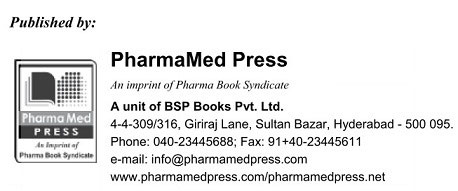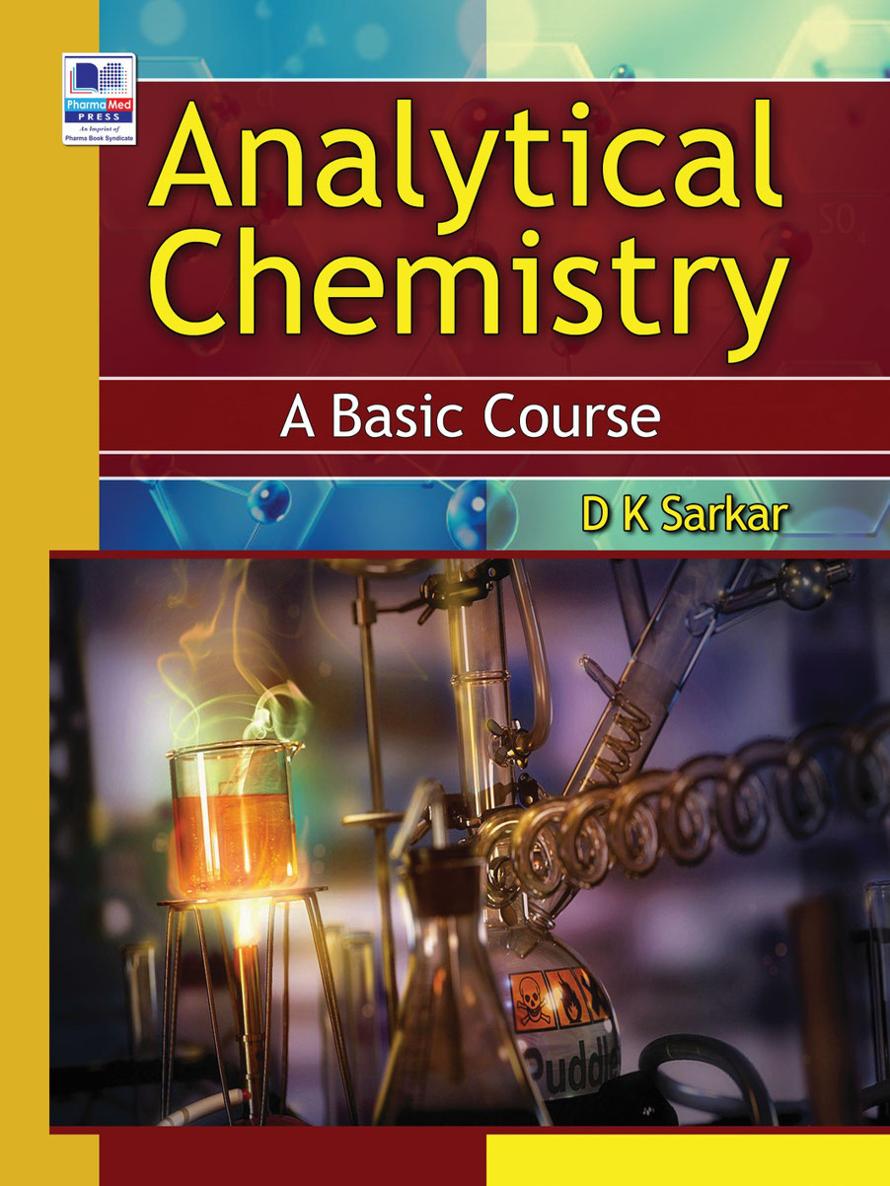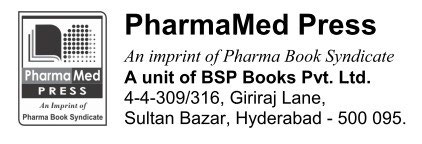Fundamentals of
ANALYTICAL
Fundamentals of
ANALYTICAL
D K Sarkar M. Sc., Ph.D.
Professor (Retired)
Acharya N G Ranga Agricultural University
Andhra Pradesh
edited by
Dr. Neelam Singla M.Pharm, Ph.D
Director
Accura Research Chemicals
Hyderabad
Fundamentals of Analytical Chemistry by D K Sarkar
2021, by Pubulisher
All rights reserved. No part of this book or parts thereof may be reproduced, stored in a retrieval system or transmitted in any language or by any means, electronic, mechanical, photocopying, recording or otherwise without the prior written permission of the author.

ISBN: 978-93-9021-140-1 (E-Book)
Preface
Analytical chemistry, a subject of paramount importance, is performed by persons with diverse interests. Some of the principal users of the subject include the students and researchers of basic science, pharmacy, medicine and clinical diagnosis, veterinary, agriculture and biology, the analysts of the laboratories of criminology and forensic science, environmental pollution monitoring agencies, pesticide residues, food safety standards, and those concerned with the quality control laboratories of the industries. All these analysts execute the quantitative assay of the substances of their interests and concerns. Apparently, the gamut of operations of the task of the analysts seems to be very mechanical and revolves around a set procedure in a set pattern and then securing the results in a preset fashion. In reality, the notion, is however, summarily wrong. The task in essence runs into a depth far beyond what one unconcerned with the subject may otherwise perceive. In practice, an analytical chemist must have an inquisitive mind and complete command - in terms of theory, practice, and skill - of every single operation, regardless of its being very small, simple, rudimentary, and trivial, that he performs in the course of the analysis. An analyst is simply incomplete in his forte sans this command and knowledge in totality. Indeed, a total understanding of the theory of analysis is a prerequisite for acquiring an authority on the skill involved in the benchwork segment of the task. An analyst thus must have a crystal clear knowledge of the reasoning and logic of adding a particular reagent at a particular point of time. This reasoning, sense, and logic provoke an analyst to look for substitutes that are even better than what is cited in the manual; eventually, it leads to more precise and accurate results of the analysis, The analyst must also be fully aware of the reasons for maintaining specific reaction conditions such as pH, temperature, ionic strength, atmospheric pressure, time, etc. during the course of the analysis, the consequences of not adhering to the defined conditions, the necessity of standardizing a method of analysis with recovery check, and the derivation of an established formula in the segment on calculations. The task of an analyst must not end with jotting down the results in the record book; rather, the analyst should examine the results and think and rethink, if there is any scope for drawing a meaningful correlation, conclusion, and practical application from the results of the analysis. In case of results far off the true or expected marks, the analyst should ponder for what, where, and when, the task went wrong, so that the erred step/s or the faulty chemical/s can be corrected or skipped or substituted as it may warrant. To that extent, the analyst must document, publish and make others aware of the lapses so that the wrong results do not recur in the future by him or someone else.
This book is an attempt in arousing these aspects in the inquisitive mind of an analytical chemist. Besides, there was a feeling that there is every need for a book on the basics of analytical chemistry in an easily comprehendible language, more so for the graduate level students of basic and applied sciences.
I shall be failing in my duty, if I do not use this opportunity to place on record my acknowledgment and gratitude to Dr. Neelam Singla. To my good fortune, she happened to go through the original script of the book and came out with her suggestion that this book with a little tailoring would fit well for meeting the requirements of the graduate-level students of pharmacy in the respective subject. To pursue the matter further, she provided the necessary inputs and most importantly, the encouragement in redesigning this book. Despite my initial reluctance in taking up the assignment, she continued insisting and volunteered even to go through the book critically and edit wherever required. And, she did what she promised.
Suggestions and criticisms for improvement of the book shall be highly appreciated.
- D K SARKAR
Contents
Preface
PART I
THEORETICAL ASPECTS
CHAPTER
Introduction
1.1 Two Major Divisions of Analytical Chemistry
1.2 Common Methods in Quantitative Analysis
1.3 Working Out Simple Calculations in Quantitative Analysis
CHAPTER
Concentrations of Solutions
2.1 Concentration of a Solution
2.2 Expressing the Concentrations of Solutions
2.3 Equivalent and Equivalent Weight
2.4 Equivalent Weight of a Substance May Vary
2.5 Interconversion of Major Concentration Terms
2.6 Standard Solution and Standardization
2.7 Primary Standard Substance
2.8 Secondary Standard Substance
2.9 Primary and Secondary Standard Solutions
2.10 Practical Considerations for Standardization Based on Titrimetry
2.11 Working Out Calculations on Concentrations of Solutions, Equivalent Weight, and Normality, Molarity and Molality of Solutions
CHAPTER
Basic Principles of Quantitative Analysis
3.1 Reversible and Irreversible Reactions
3.2 Law of Mass Action
3.3 Acids and Bases
3.4 Conjugate Acid and Conjugate Base
3.5 Strong and Weak Electrolytes
3.6 Degree of Dissociation of Weak Electrolytes
3.7 Dissociation Constant of Weak Acids -
3.8 Ostwalds Dilution Law
3.9 Solubility Product
3.10 Difference Between Solubility Product and Ionic Product
3.11 Solubility of Sparingly Soluble Salts in Relation to their Solubility Product
3.12 Precipitation of Sparingly Soluble Salts
3.13 Solubility Product and Common Ion Effect
3.14 Applications of Common Ion Effects
3.15 Effects of Diverse Ions on the Solubility of Salts
3.16 Complex Ions
3.17 Ionic Product of Water - The Basis for pH Scale
3.18 pH of Strong and Weak Acids and Bases
3.19 Buffers
3.20 Henderson Hasselbalch Equation
3.21 Hydrolysis of Salts
3.22 Hydrolysis Constant of Salts
3.23 Oxidation Reduction Reactions
3.24 Oxidation Reduction Reactions Expressed in Ionic Forms
3.25 Redox Potential and the Two Component Half Reactions of a Redox Reaction
3.26 Oxidation State and Oxidation Number
3.27 Balancing Oxidation Reduction Reactions










